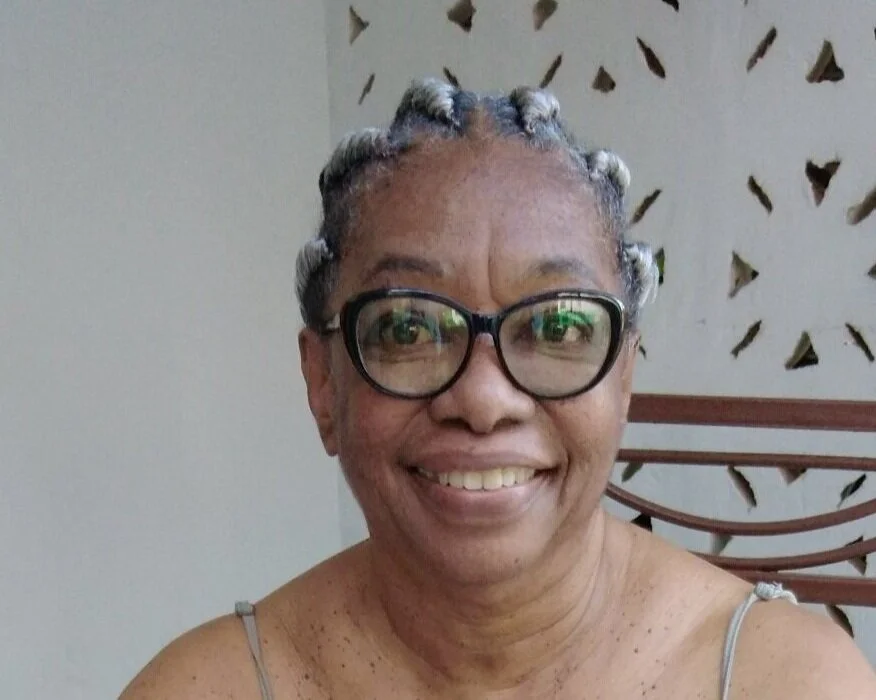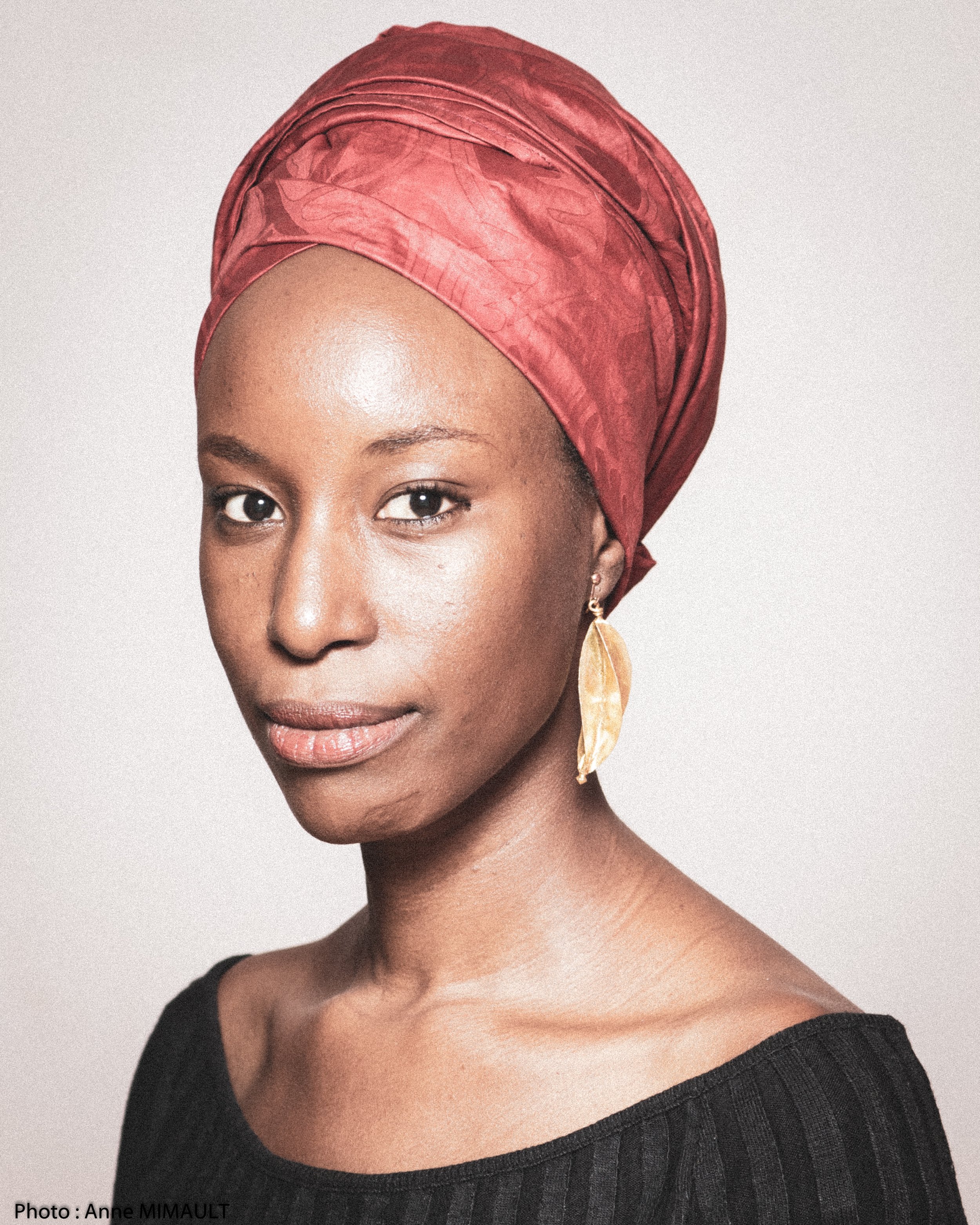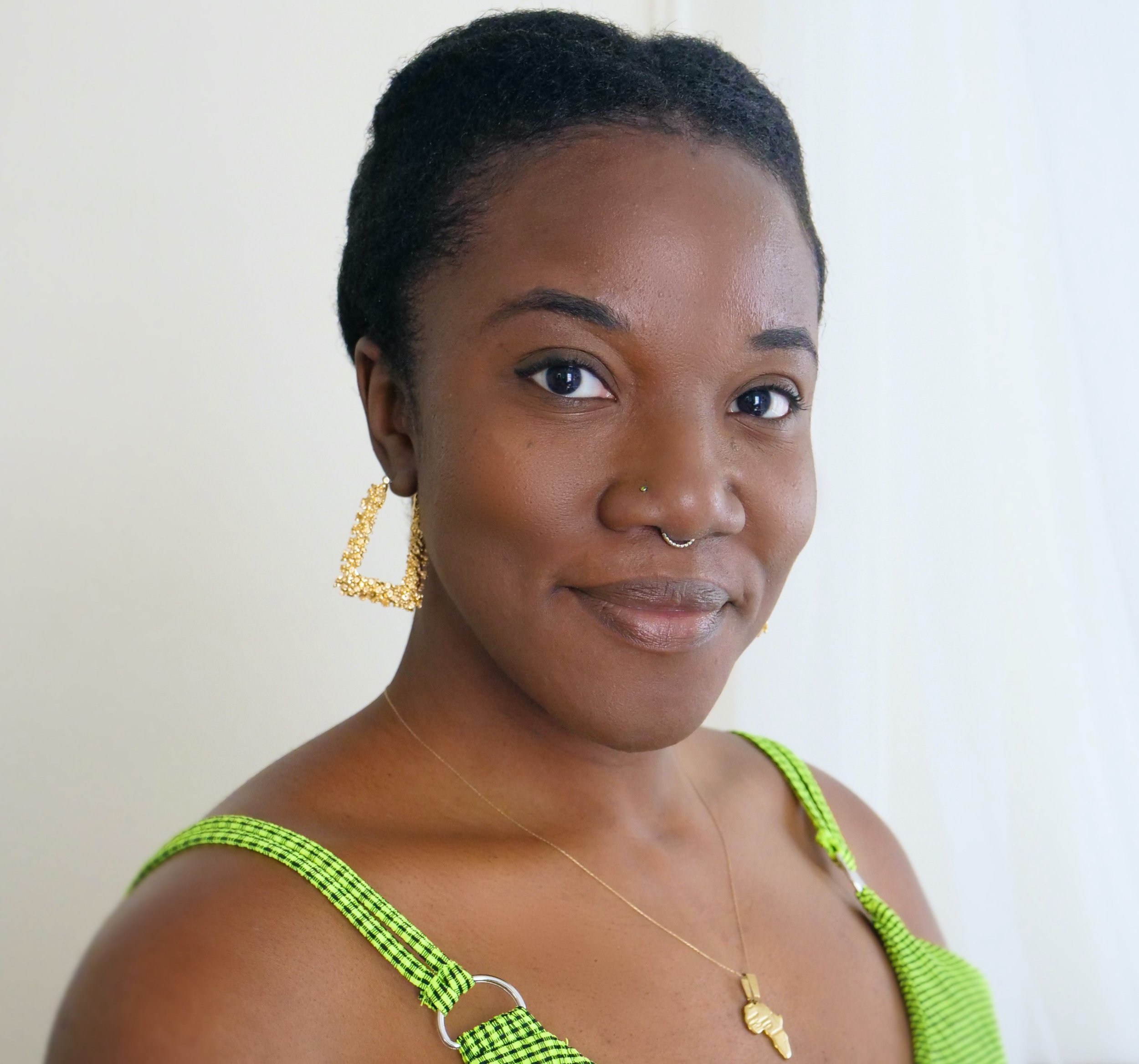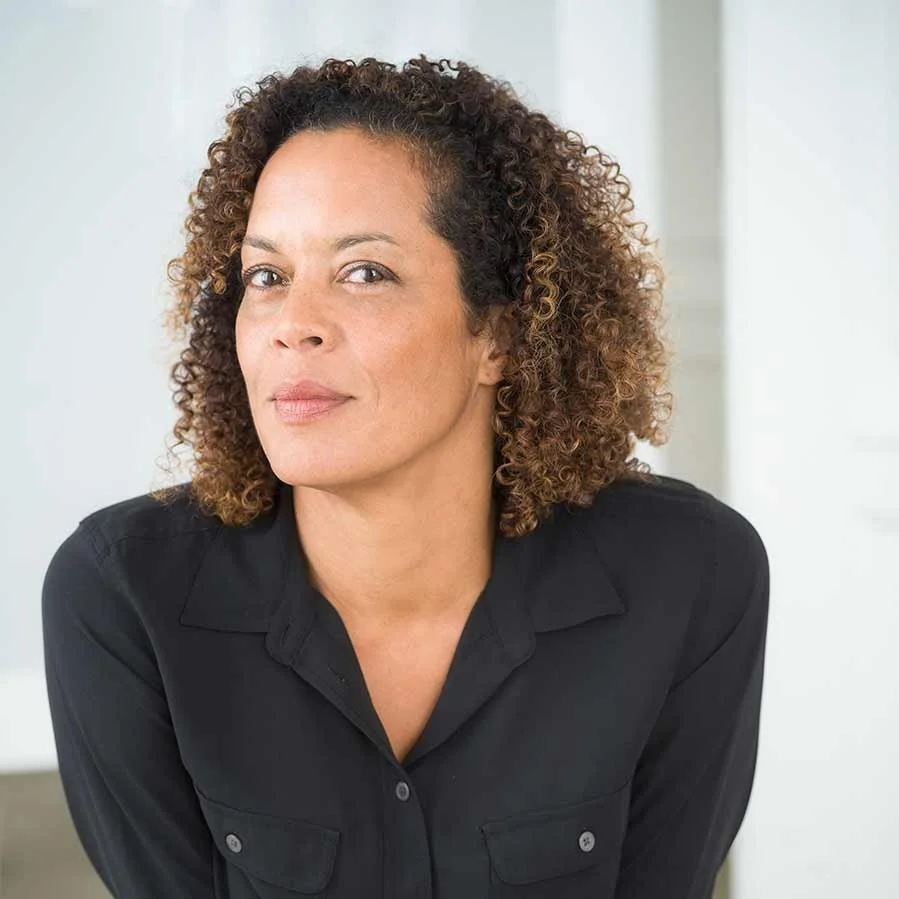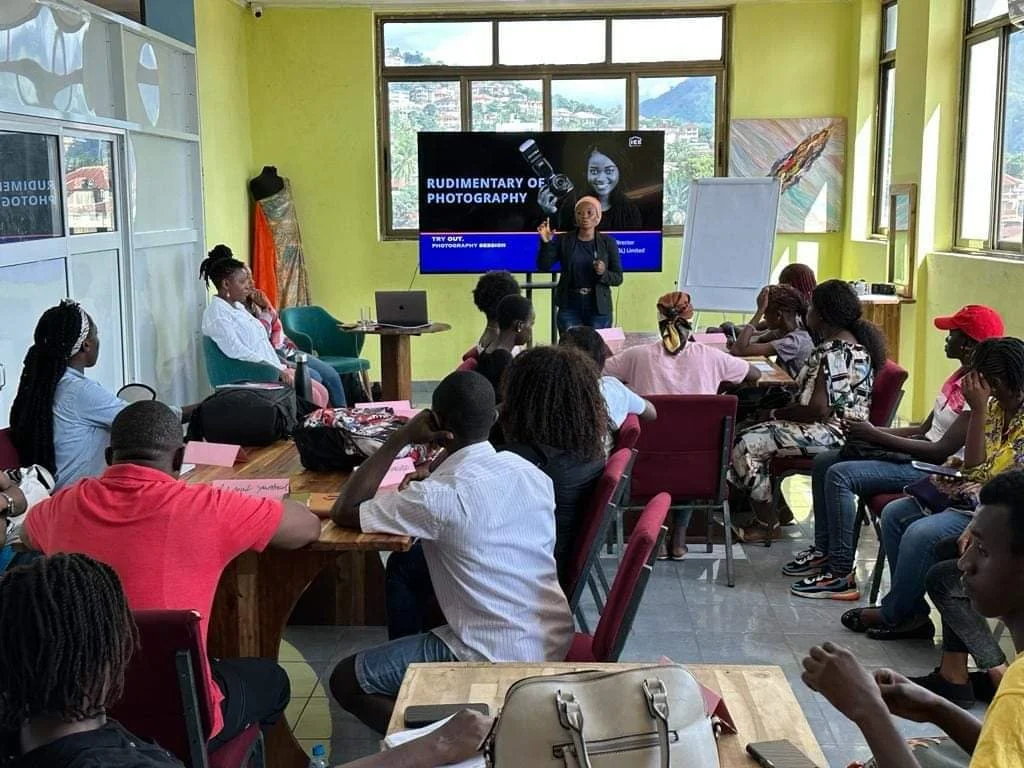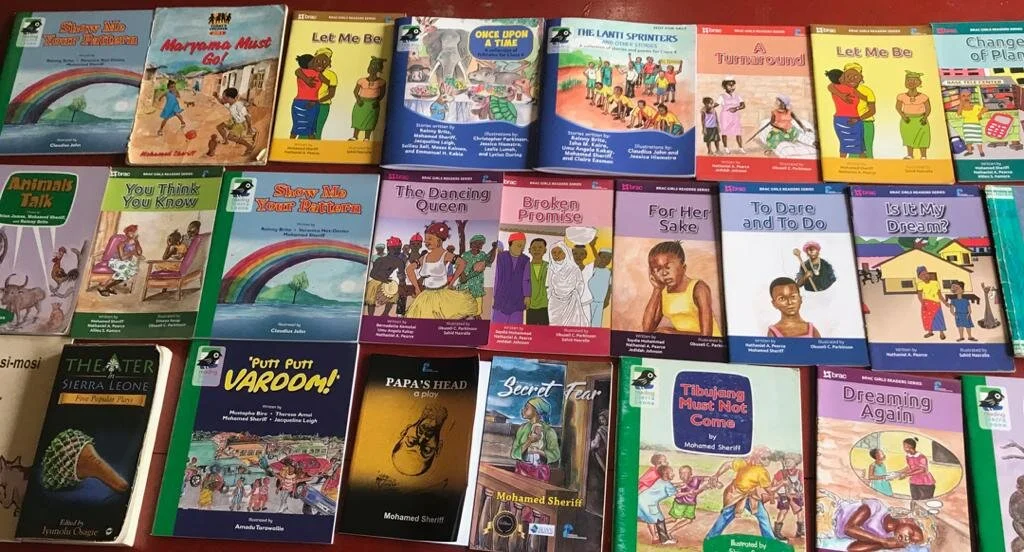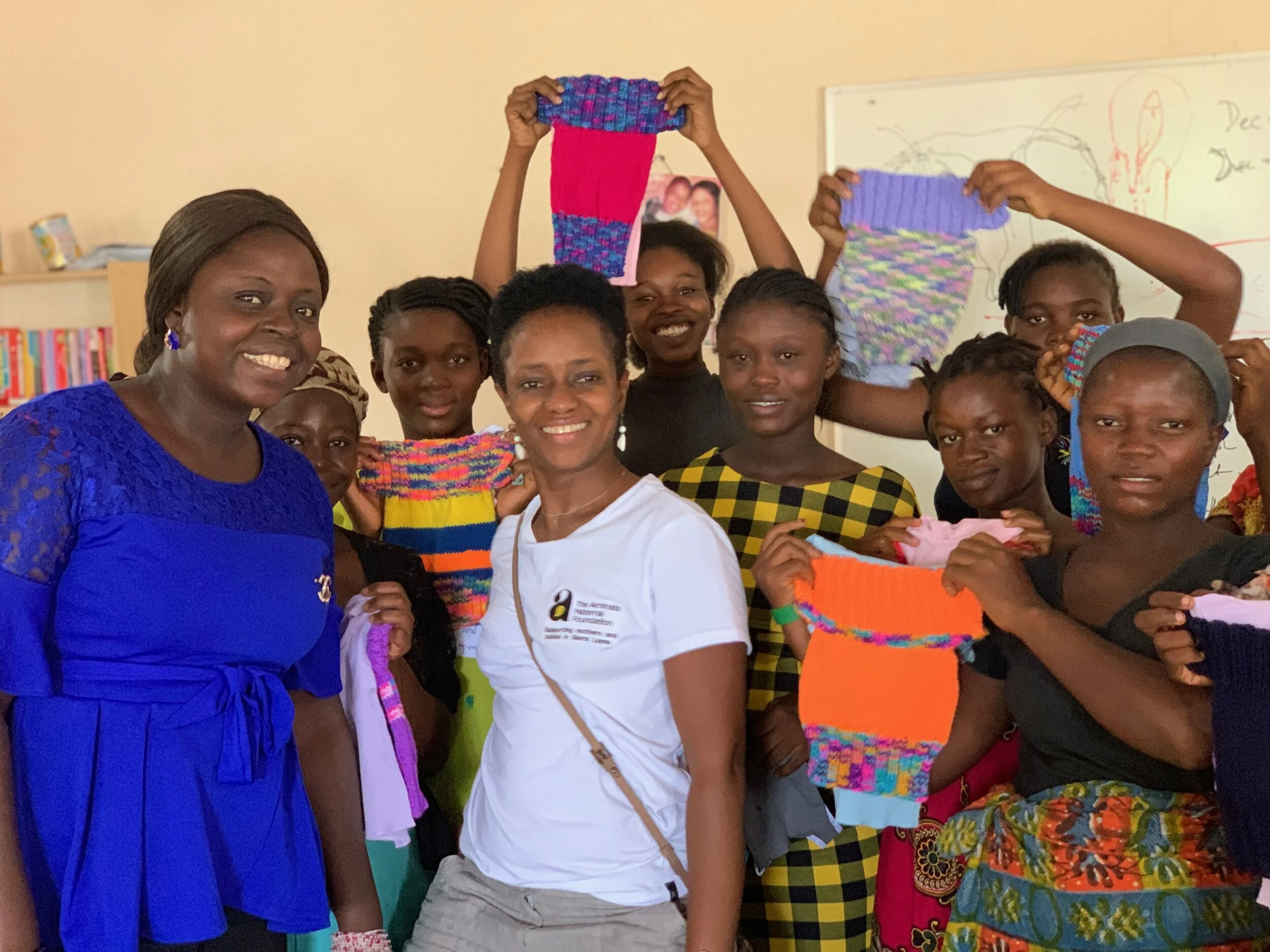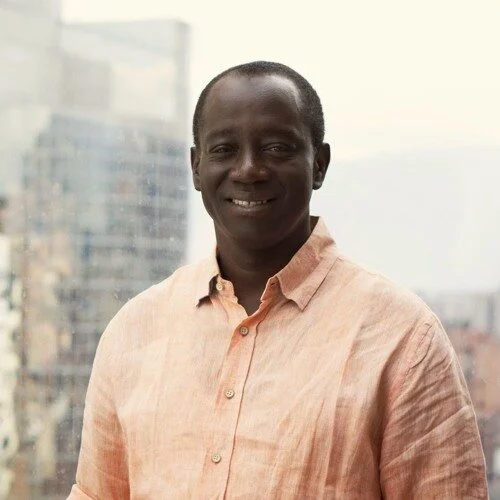
Sierra Leone at 60: Playwright Charlie Haffner Reflects
To celebrate 60 years after gaining independence, Poda-Poda Stories , interviewed Charlie Haffner, legendary Sierra Leonean playwright, founder of Freetong Players, and creator of popular radio drama Atunda Ayenda.
Charlie Haffner talked about the use of theatre arts over the years, and what Sierra Leoneans should reflect on after 60 years of gaining Independence.
Yema Lucilda Hunter on Documenting Sierra Leonean Lives through Fiction.
Yema Lucilda Hunter is a celebrated Sierra Leonean novelist, biographer, and librarian. Her work includes Road to Freedom, Bittersweet, Her name was Aina, and a biography: An African Treasure - in Search of Gladys Casely-Hayford. Lucilda Hunter was born and raised in Freetown, Sierra Leone. She attended the Annie Walsh Memorial School and studied in the United Kingdom, qualifying as a librarian. As a librarian, she worked for the the Ministry of Health and Sanitation in Sierra Leone, WHO, and was made a Fellow of the British Library Association, since renamed The Chartered Institute of Library and Information Professionals. As a writer, Yema Lucilda Hunter illustrates everyday Sierra Leonean life into rich prose, through her keen eye as a documentarian.
In this email interview with Poda-Poda Stories, Hunter shares the inspiration behind her writing.
Poda-Poda: Thank you for joining the Poda-Poda. Tell us about your journey as a writer and librarian? Did you always want to be a writer or was it something you fell into?
Yema Hunter (YH): I hesitate to call myself a writer as I don’t often feel compelled to put fingers to a keyboard, or pen to paper, though I always enjoyed and got good marks at school for what used to be called ‘Composition’. However, I AM the author of six novels and a work of non-fiction. My career as a professional librarian is what started it. While browsing the shelves of the Africana Collection at the National Library in Sierra Leone, I came across an old book in which a 19th Century visitor to Freetown mentioned a brief encounter with one of the black Nova Scotian settlers who arrived in the country in 1792. I learned some history of which I had been totally unaware and found it so fascinating that I felt other Sierra Leoneans, especially citizens of Freetown, might find it equally interesting, especially if it was conveyed in a non-scholarly manner. That was how I came to write my first novel, Road to Freedom, published in 1982. A new edition has recently been issued with the title Seeking Freedom.
Poda-Poda: What is the inspiration for writing your novels, particularly BitterSweet and Redemption Song?
YH: Sierra Leone, Freetown in particular, has inspired all my novels. The story line for Bittersweet occurred to me following the sudden death by road accident of a young cousin. I imagined the plight of a young wife and mother unexpectedly widowed, and the story unfolded from there. Redemption Song came twenty-five years later and was inspired by the civil war in Sierra Leone. Though the country is never mentioned and the course of events is ahistorical, anyone who knows Sierra Leone and experienced the war has no difficulty discovering the story’s setting.
Poda-Poda: In writing your novels, do you often find that you put a certain lens on, or a unique perspective? If so, what are they? What are some of the issues you want to highlight when writing?
YH: I write novels about Sierra Leoneans for Sierra Leoneans, thought it is gratifying when non-Sierra Leoneans enjoy them as well. My main characters are usually, Krios, descendants of the Liberated Africans who were settled in the Freetown area early in the 19th century. Of course, over the years, their interactions with members of the indigenous populations has become more frequent, hence no novel is only about Krios. My intention is to write stories about ordinary Sierra Leoneans living ordinary lives.
Poda-Poda: What is your writing process like? Do you have a certain pattern or routine?
YH: I am fairly disorganised . I have an idea for a story and once my first paragraph is clear in my mind, I plunge straight in, seeking necessary information and fleshing out the main characters as I go along. Progress of the story tends to be organic as I never know exactly what is going to happen until it does. I edit chapter by chapter and do a complete revision when the work is complete.
Poda-Poda: Poda-Poda Stories highlights authors from Sierra Leone, and it has often been difficult to discover the work of Sierra Leonean female writers pre the 21st century. You’ve also written a biography: An African Treasure, in Search of Gladys Casely-Hayford, 1904 – 1950, about Gladys Casely-Hayford, whose work isn’t quite well known, especially in Sierra Leone. How important is it to know about Gladys, and also to discover Sierra Leonean female authors during her time?
YH: Probably, there were not many published Sierra Leonean female writers up till the mid to late 20th Century. Adelaide Casely-Hayford and her daughter, Gladys are the only two pre-independence female writers I can think of. After independence, female writers of textbooks and supplementary readers for primary schools began to appear. Talabie Aisie Lucan and Melvine Stuart come to mind. I am not aware of any bibliography of Sierra Leonean female writers in the country, but I believe another Sierra Leone-born librarian, Wilma Jones, has produced one. However, she lives and works in the US and I am not aware that it has been formally published or is available in Sierra Leone. The problem is that Sierra Leone is not a nation of readers. Unless a literary work has been used as a school textbook, eg, my novel Road to Freedom, it remains largely unknown. I have the impression that most Sierra Leoneans acquainted with Road to Freedom, are not even aware that I have written other novels.
Poda-Poda: You’ve also had quite an illustrious career as a librarian. In your work, has accessing information become easier and what is the future of digital archiving in Africa especially?
YH: I retired more than twenty years ago, but even then, thanks to computer technology, accessing information had become far easier than it was at the start of my career. It has become easier still. Anybody can Google and search the internet in other ways. However, the skills of librarians and other information professionals are still needed for assessing the relevance and accuracy of information obtained. Digital archiving is a boon to developing countries where document preservation and storage has often been most unsatisfactory. I have been delighted to learn that archival digitization projects are being planned or are actually on course in Sierra Leone.
Poda-Poda: We always ask writers this question. How has writing saved your life?
YH: I would not say that, but it has certainly enriched my life, though sadly, not financially. I have always been an avid reader but writing my own books has forced me to widen the scope of my reading as works in progress often require considerable research.
Aminata Conteh-Biger on Healing Through Memoir
In 1999, Aminata Conteh-Biger was kidnapped from her family, and held captive by rebels during the civil war. Years later, she wrote a memoir Rising Heart, a memoir in which she shares the story of how she was rescued by UNHCR, found a new life in Australia, and giving back to Sierra Leone through her maternal health foundation. For Aminata Conteh-Biger, writing the memoir was a path to healing and a way to come to terms with what she faced during Sierra Leone’s civil war. Now, Aminata gives back to her country through the Aminata Maternal Foundation, to support maternal health in Sierra Leone. In this interview, Aminata Conteh-Biger shares how she rebuilt her life as a refugee, and wrote through trauma.
Poda-Poda:Thank you for granting us this interview. Tell us about yourself, your background, and your journey as a writer.
Aminata Conteh-Biger: I was born in Freetown and grew up in Kissy. I was raised by my father Pa Conteh, along with my 3 siblings. In 1999, I was kidnapped by the rebels, torn from my father’s hand. I was held by the rebels for months and released as part of an exchange for supplies. In 2020, I released my memoir, Rising Heart, with Pan Macmillan Australia. I wrote Rising Heart with my ghost writer Juliet Rieden, a highly respected journalist and author. I always wanted to write a book, and had many offers to do so over the years, but I did not want to do it until I had given something back to my home country Sierra Leone.
Poda-Poda: Tells us about your memoir, Rising Heart. What inspired you to write it and share your story?
ACB: I had always wanted to tell my story. I wanted to write it for the women of Sierra Leone who experienced the same as what I went through, and for the men who committed the atrocities against us to understand what they took from us. I also wanted to write it to show the world the realities of war and conflict – and the ongoing experience - of African nations. I feel very strongly there is not nearly enough general awareness of the challenges endured by African people, both now and in recent and past history.
Poda-Poda: We recently commemorated the National Day of Reconciliation in Sierra Leone on January 18th. You have shared your story through your memoir. For many survivors of the war, sharing the story of what happened to them is a difficult process. We do not have adequate psychosocial services in Sierra Leone to fully deal with the trauma of war amputees, victims of sexual violence, and refugees. What can we do, as a society, to help heal through our trauma, even when we lack those professional resources?
ACB: The answer to this is in the government. It is the duty and responsibility of our leaders to look after the wellbeing of their people. People in a position of power must create and make available safe spaces for the vulnerable, in order to allow them to live their best life.
In a country like Sierra Leone, where there is such recent national trauma, there must be assistance and services for them. Current services in Sierra Leone are not strong and there is one major reason why. There is a lack of acknowledgement and awareness of the war and its impact, not just from the government, but from the population as a whole.
Poda-Poda: There was so much unimaginable trauma because of the war, and so many of us still carry that and walk with that. How can we carry that trauma, and still try to change the story of our country for good?
ACB: This is difficult to answer, as we Sierra Leoneans can’t even face the truth of what happened to us. I have witnessed for myself the lack of knowledge young people have of recent events.
This lack of knowledge is because the previous generation, the people who lived through it, do not discuss the realities of what happened. So, how can younger people learn their own country’s history? As a nation, we cannot heal from trauma when the events and actions that caused the trauma are not acknowledged, let alone discussed amongst families or taught in schools.
Africans are so strong, and have faced so much adversity. I feel this inner strength needs to be applied to having uncomfortable, upsetting conversations in order to change the story of our country for good. Even here in Australia, where Sierra Leoneans support my foundation work, I promise you, maybe only two Sierra Leoneans would have bought my book, Rising Heart. They are scared to face my story because it will remind them of theirs.
Poda-Poda: Tell us about your work with maternal and child health in Sierra Leone. How did that come about and what are your plans for your organization?
ACB: The Aminata Maternal Foundation came about following my near-death experience while giving birth to my daughter Sarafina in 2012. Sarafina suffered from shoulder dystocia at the time.
During my pregnancy and Sarafina’s birth, I had access to high-quality healthcare here in Australia, like all women do. This compelled me to give back to the women and girls of Sierra Leone and help to improve the unacceptable maternal health and infant mortality rates. I immediately felt a sense of responsibility. My papa always taught us, “we get, we must give back”. He showed his children that it is more of a blessing to give than to receive. I do not have any family in Sierra Leone and this actually inspired me to go back home to contribute, especially because of my two children, Sarafina and Matisse. I want them to know where their mama comes from because I incredibly proud of my homeland Sierra Leone.
My vision now is to buy the hotel in Freetown my father owned and make it a hospital. But before then, my goal is to get as many midwives as possible trained, and hopefully open a children’s ward in the Aberdeen Women’s Centre so the staff can increase their capacity for check-ups and vaccines. My foundation has been working with the Aberdeen Women’s Centre since 2014, but I need the government to help us get this land. The funds are ready but we need land.
Poda-Poda: How did writing your story save your life?
ACB: It didn’t save my life. However, writing my book was a very important process, as it allowed me to establish the fact that I own my story – my story does not own me. I am not ashamed of what happened to me. I am proud of my scars because they have shaped and continue to shape the human being that I am. I always knew I was born to do something good and greater. My grandpa and my older brother, Alieu, always spoke so powerfully on my life ever since I was a baby. So despite my story, I was born for something greater, and I’ve always believed it is as a humanitarian.
Find out more about the Aminata Maternal Foundation at aminatamaternalfoundation.org
Oumar Farouk Sesay on the Transformative Power of Poetry
Oumar Farouk Sesay is a published poet, novelist, and playwright. He was resident playwright of Bai Bureh Theatre in the '80s, and he has written several plays. He has been published in many anthologies of Sierra Leonean poets, including Lice in the Lion's Mane, Songs That Pour the Heart and Kalashnikov In The Sun. He is the President of PEN, Sierra Leone chapter. Using vivid imagery and metaphors, Sesay’s poems are beautifully woven, richly capturing the heartbeat of Sierra Leone. It was an honor to interview him, and he shared his creative journey with Poda-Poda Stories.
Poda-Poda: Thank you for granting me this interview. Tell us a little bit about yourself, your background, and your career as a poet.
FS: Thank you very much and I am delighted to a part of this. I started writing as early as in my teen years when I was in sixth form. Those were the days of theater groups in Sierra Leone. I was commissioned to write a play for Bai Bureh Theater Group, which was performed at City Hall, and that was my maiden work as a writer. Then I started dabbling with poetry here and there, but not in a serious way as I had engaged with theater. It was later in life that I started writing poetry. Then after university, I worked as a journalist briefly, for local newspapers like The Chronicle newspaper, and International papers like West Africa magazine. Later, the calling for poetry was so strong, so I became a poet. Occasionally I do articles for newspapers, but I am much more engaged in poetry writing than other forms of writing.
I came to the U.S. and I was fortunate to publish my first collection of poems “Salute To The Remains of a Peasant”. Those are poems that captured, events during the war in Sierra Leone. I later published another collection of poems, written post-war poems and some other themes of corruption and antisocial activities within the country. That collection was “The Edge Of A Cry.” Then after that, I was able to publish my first novel, “Landscape of Memory”, which addresses the theme of the war and its impact in Sierra Leone. I was also a Cadbury visiting Fellow, at the Birmingham University in the U.K and a fellow at the Baptist University in Hong Kong.
Poda-Poda: You mentioned you were into journalism and then you took up poetry later. How did that transition happen?
FS: It is difficult to place a finger on it, because poetry has a magnet that pulls a writer than other forms of writing. I felt preoccupied with issues happening around me, mostly during the war, and I started capturing it in metaphors that were so strong that I thought if I put them in prose, I might not have been able to capture them as exactly as they were.
Poda-Poda: Tell us about your new book, 400 Years of Servitude. Why did you decide to write this anthology?
FS: 400 Years of Servitude is mostly a collection of poems that deal with the theme of race relations and the impact it has on African Americans and Africans. There are cultural forces in international politics that tend to dictate the way we (black people) are treated all over the world. For example, policy makers in America and in the Western world, have a tendency of treating Africans in a manner akin to the way African Americans here are treated, like a lower caste of people. I was basically trying to see a correlation between the treatment of Africans and African Americans here in America. I saw that the connection is race. I started putting together poems that largely deal with race and race relations, and I did a span of 400 years, from the time the first slave was transported from Africa to the New World to date. There are poems that deal with the Middle Passage, and that deal with African Americans. That is why I called it 400 years of servitude.
Poda-Poda: That is a very good title. I interviewed Ishmael Beah and asked him a similar question to this: As a black writer living in the U.S, do you think it's your duty to write about global blackness or the global perception of blackness?
FS: Well, I think so. I wrote a poem about race relations called “The Look”. When you go into places here in the US , you are given a look that carries with it the burden of servitude, the look carries the historical baggage that was given to our brothers when they were chained in the plantations of yesteryears.
This look follows like a chain on your soul wherever you go. It became apparent that my African-American brothers were also giving me a look of a similar slant as if I am the Judas who sold a brother for thirty pieces of silver.
An excerpt from the poem is “brother, don't look at me. The look that they look at me for looking like you.”
Yes. the question of race relations must be addressed by authors for the benefit of the entire race. Writers do not write in a vacuum, you must really make sure your work has affinity to the reality around you, and race relations concerns writers everywhere in the world. I think as Sierra Leonean writers, we should be concerned with that too.
Poda-Poda: Your work has a lot of imagery and touches on a lot of themes. Some recurring themes in your work are patriotism and healing. How do you think literature, especially poetry, can help heal our nation and move us forward?
FS: Interestingly, we had a group that was formed during the war that was called Falui Poetry Society. Most of the prominent Sierra Leonean poets were members of that group, and we were able to organize poetry reading in public places and in private places. The reason being, poetry itself has a healing power.
As a collective, we published our poems at a time when the Special Court began in Freetown. Fortunately, the prosecutor, David Crane, was present when we launched the book that we published. “Songs That Pour The Earth” was the first collection we ever put together as an anthology that captured the poems of the war. He was at the launch and he bought the book. During the opening remarks of the Special Court, he read a poem by Sydnella Shooter, which chronicled the atrocities during the rebel war.
So as poets, we are witnesses. Just as Walt Whitman and other poets were witnesses to the American civil war, Sierra Leonean poets bore witness of the war in Sierra Leone. And we captured it in ways that will forever be there for posterity to see. We happened to be the first prosecution witness called upon to account for what we saw and felt during the eleven-year war.
Poda-Poda: You were a resident Playwright for the Bai Bureh Theatre, and you have also published several books. Of course, it is not a secret that it is a challenge being a creative person in Sierra Leone. What are some of the challenges that you faced and how have you been able to hold on to your craft for so long?
FS: From a personal point of view, writing is a very private project, a very private exercise. It starts as a migration from your mind to the public and that route is hurdle- prone in ways that affect the tenor and texture of the work created.
In the creative process you sometimes think in your native tongue and haul the thought to the page in another – this process done mostly at a subconscious level. You do not even know you are doing that. You may not even know that you are doing that until an idea from one culture refuses to yield meaning in another language. In the process of doing that, the question of how you maintain the balance to make sure that the purity of your thoughts is not is not diminished in another language? Those are creative challenges and poetic license sometimes help us navigate through those hurdles.
The bigger challenge though, is how seriously people in Sierra Leone and mostly other African countries take their writers. Writers have been on the forefront of the struggle for the independence of the continent. If you check South African history for example, writers like Dennis Brutus played an important role in making sure the of apartheid was exposed. In Nigeria, Wole Soyinka and Chinua Achebe contributed immensely in enhancing the creative image of the country and in promoting democracy. Thanks to them the expectation of the public from writers goes beyond the literary. The image of writers as agents of change put them in direct confrontation with authority sometimes with disastrous effect to the writers.
We come into writing with the onus of not only doing art for art's sake but with a manifesto to usher change. Ours is not art for art sake but art you can use to usher change; those who wants the status quo to remain unchanged perceive writers as opponents.
And of course, the question of readership is another big problem that we have. Most people started reading me when one of my poems made it in the West African exams’ syllabus- hence reading me becomes a matter passing or failing exams.
So, we must create a climate whereby we grow big at home, then seek recognition outside. In our own case, it’s the other way around. I think it’s because we have the “made in UK mentality” wherein we grew up buying sneakers that are made in the UK, so we also think that our talent must be made somewhere else before it is respected at home.
Poda-Poda: That is also an issue that's very interesting because I do agree with you that we tend to value creative work that’s acknowledged in the US or the UK, while people are making good work here at home too. That’s why I want Poda-Poda Stories to highlight the work being done at home too.
FS: The work Poda-Poda is doing is so good. There was a famous Sierra Leonean playwright, Kolossa John Kargbo. He was one of the best back in the day. He died in Nigeria and he was buried there. And just this year his play “Let Me Die Alone” is also been included in the West African exam syllabus. He also wrote Tabita Broke Ose, a comedy, and I’ve seen fragments of his work being projected in some social media posts lately, and I wonder about the fate of his many manuscripts.
We must have pride in who we are as a people. It's very important that some of us keep writing. It is difficult for a nation to exceed the potential of the story they narrate to themselves. The stories we tell each other, the stories we narrate of ourselves determines who we are as a nation. A story that constantly says “Salone nor betteh” might just create a failed state.
Poda-Poda: In what ways do you think literature, and the creative arts, has the function to shape our society as Sierra Leoneans, especially for the younger generation ?
FS: When we start to use language in the abstract, we start to use language to imagine a reality that is not yet in existence. Language give us the ability to create fiction. It is the creation of the fiction that sets human beings apart from other species.
In A Brief History of Humankind, Yuval Harari says because we can use language, we are able to create that which does not exist. And we create institutions that are creation of our imagination. We talk about human rights for example. You know, these are not concrete things, but because we are able to use the language to create that, we are able to organize society around the concepts that are not concrete. That is the power of language. We can imagine things that are not in existence and we can use that imagination as a signpost to guide us into greater good. Literature inspires, and it helps young people to imagine. For most people, the truth of fiction is the only truth they cling to in their journey through life.
Find out more about Oumar Farouk Sesay’s work at farouksesay.com
Questions and interview by Ngozi Cole.

